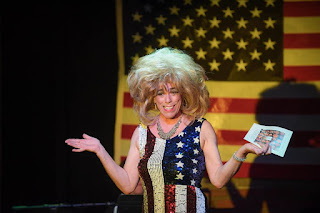Sometimes,
this job takes you by surprise.
Sometimes, you’re enjoying a pleasant, sunny Sunday afternoon and you
walk into a theater to see a matinee rendition of a show you’ve seen done
splendidly three other times. So expectations are not very high. And then,
you’re blown sideways by a great performance.
So
it is with Next To Normal, now being
presented by the Lorain County Metro Parks and TrueNorth Cultural Arts. While
this production may not equal the others I’ve seen (at Playhouse Square, Beck
Center and Lakeland Civic Theatre) in terms of vocal quality and range, I’ve
never been impacted so powerfully and emotionally by this play about a woman
with severe manic depression.
Director
Fred Sternfeld has never been better as he scouts out all the tiny beats and
pain points in this riveting, virtually sung-through story, without ever
toppling over into maudlin sentimentality. The powerful score by Tom Kitt and
the perceptive book and lyrics by Brian Yorkey fit together seamlessly in this
version, as we see a suburban family trying to grapple with mom’s often
debilitating condition.
And
the cast is well-nigh perfect. Kristin Netzband embodies all the determination
and confusion of a woman whose mind is betraying her, and Rick McGuigan as her
husband Dan is a bundle of contradictions as he tries to cope. Their two kids
are played with well-modulated finesse and intensity by Kat Hargrave as
17-year-old Natalie and Tony Heffner as Gabe. Indeed, Heffner ripples with
clenched frustration even when he’s in shadows on stage, giving his unique role
added heft.
As
Natalie’s main squeeze Henry, Robert Kowalewski is a slightly off-center and
believable match for Hargrave’s Natalie. And even with a couple line blips,
Justin Williams is solid as the two docs who treat Diana.
The
production is enhanced by a set created by one of the area’s A-plus design
teams. Ron Newell’s simple yet evocative scenic design, employing three
distorted frames, strung tight with strands, functions as an apt visual
metaphor for Diana’s struggles. And T. Paul Lowry’s projections within and
around those frames offer just enough counterpoint without becoming
distracting. That combination, especially when an actor is standing behind
those frames, is wonderfully ethereal and a bit spooky. Indeed, all the
designers as well as the five-piece orchestra under Anthony Trifiletti’s baton
help make this production gleam.
So
if you’re one of those people who never want to drive to the west side, or the
east side, to see a show, get over yourselves. There’s a special show out in
Sheffield Village, and it’s worth the trip!
Next
To Normal
Through
May 22 at TrueNorth at French Creek, 4530 Colorado Ave., Rt. 611, Sheffield
Village. 440-949-5200, or www.tncarts.org




